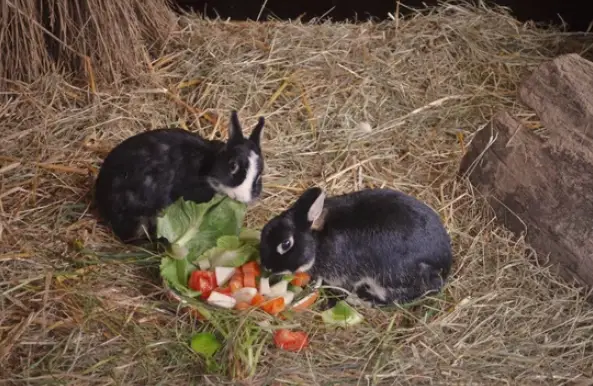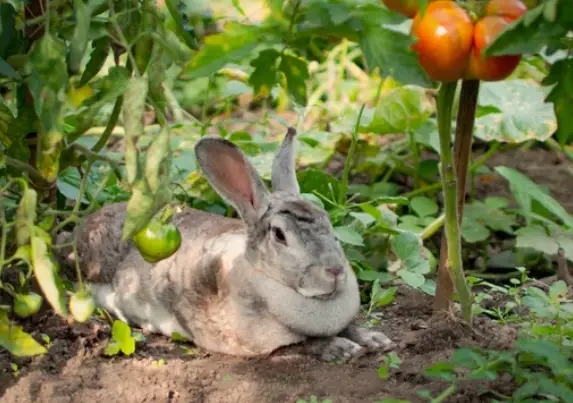What Animals Eat Garden Tomatoes?
Gardening enthusiasts often invest time, energy, and care into growing a variety of vegetables, with the prized tomato being a garden favorite.
However, gardeners often face the challenge of protecting their cherished tomatoes from various animals that view these plump, juicy fruits as a delectable treat.
Let us look at the different animals that are attracted to garden tomatoes, their methods of access, and strategies to protect your precious crop.

Animals Eat Garden Tomatoes
Birds
Birds are one of the most common tomato predators in gardens.
Species like sparrows, starlings, and crows are known to peck at ripe tomatoes, causing damage.
These feathered invaders are attracted to the bright colors of the fruits and the seeds inside.
To deter birds from feasting on your tomatoes, consider using protective netting or hanging shiny objects like aluminum foil strips near your plants.
Scarecrows can also be effective in keeping them at bay.
Related post: how to keep deer out of vegetable garden
Squirrels
Squirrels can be relentless tomato thieves.
Their dexterity and agility enable them to climb plants or leap onto branches, making it easier for them to access the fruits.
Squirrels are known to take a single bite out of a tomato and move on to the next one, leaving a trail of half-eaten fruits.
To prevent these critters from plundering your garden, consider using physical barriers such as wire mesh or plastic fencing.
Raccoons
Raccoons are opportunistic feeders and have no qualms about helping themselves to a tomato feast in your garden.
They are notorious for their ability to open gates, lids, or even burrow beneath barriers.
To protect your tomatoes from raccoons, use heavy-duty barriers like electric fences, motion-activated lights, or a secure garden enclosure.
Deer
Deer, with their voracious appetites, can quickly demolish a tomato patch.
They are drawn to the tender foliage and ripe fruit.
To keep deer at bay, use deer-resistant fencing, install motion-activated sprinklers, or use deer-repelling sprays, which can help deter these large herbivores.
Groundhogs
Groundhogs, also known as woodchucks, are adept diggers and can burrow under fences or barriers to access your tomatoes.
To thwart these garden intruders, ensure that your garden fence extends below ground level or use a wire mesh as a barrier.
Additionally, groundhog traps can be effective in relocating them away from your garden.
Insects
While not animals in the traditional sense, insects can also cause damage to your garden tomatoes.
Common culprits include hornworms, aphids, and stink bugs.
To combat these pests, consider using natural remedies like neem oil or introducing beneficial insects like ladybugs that can help keep the pest populations in check.
Slugs and Snails
Slugs and snails are notorious for leaving behind slimy trails on tomatoes and other garden plants.
They’re most active during the night and on damp, overcast days.
To deter these mollusks, you can use physical barriers like copper tape, which they dislike coming into contact with, or set up traps baited with beer to lure and drown them.
Opossums
Opossums are omnivorous creatures and may occasionally sample your garden tomatoes, especially if other food sources are scarce.
These marsupials are skilled climbers and can reach tomatoes growing on trellises or raised beds.
To protect your crop from opossums, you can use a combination of fencing and netting as a physical barrier.
Ground Beetles
While many beetles are considered pests in the garden, some ground beetles are beneficial because they feed on smaller pests like slugs and caterpillars.
However, certain ground beetles may also nibble on ripening tomatoes.
The best approach here is to maintain a balanced ecosystem in your garden to encourage beneficial insects while controlling pest populations through natural means.
Mice and Rats
Mice and rats can be attracted to the seeds of ripe tomatoes, and they may nibble on the fruit as well.
To deter these rodents, maintain a clean garden environment, store harvested tomatoes properly, and consider using traps if they become a recurring issue.
Beetles
Various beetle species, such as Japanese beetles and Colorado potato beetles, can occasionally be attracted to tomato plants.
They typically target the leaves of the plants rather than the fruit.
To control beetles, you can use organic insecticides, hand-pick them, or introduce natural predators like parasitic wasps and predatory beetles.
Rabbits
Rabbits are herbivores and may consume the tender leaves and stems of tomato plants.
To protect your garden from rabbits, consider installing a sturdy fence with mesh fine enough to prevent them from squeezing through.
Chipmunks
These small, agile rodents may take a liking to your ripe tomatoes.
They can climb plants and often create tunnels near garden beds.
Prevent chipmunks from reaching your tomatoes by using physical barriers or traps.
Turtles
Turtles, particularly aquatic turtles, may venture into your garden and sample ripe tomatoes.
You can deter them by constructing barriers or protecting the lower part of your tomato plants with fencing.
Worms and Caterpillars
Various caterpillar species, like the tomato hornworm, can devour tomato leaves and occasionally fruit.
Handpicking or using biological controls, such as introducing parasitic wasps, can help manage these pests.
Conclusion
It’s critical to employ a variety of tactics to secure your crop in the fight to prevent your garden tomatoes from being eaten by numerous animals.
You may reap the rewards of your labor without continuously worrying about these tomato-loving visitors by recognizing the specific pests in your area and taking preventative steps.
Keep in mind that the abundance of tomatoes in your garden can be preserved to a large extent by a combination of physical barriers, natural deterrents, and routine upkeep.
So long as you employ the proper strategies, you can enjoy those juicy, sun-ripened tomatoes without giving them to opportunistic garden guests.




